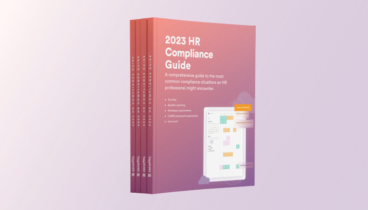Here’s what employers need to know about how to stay compliant with the Pregnant Workers Fairness Act (PFWA) and the PUMP Act.

Here's what you need to know:
-
The Pregnant Workers Fairness Act requires that employers provide reasonable accommodations to pregnant women that would allow them to continue to work, and it applies to employers with 15 or more employees
-
The PWFA is modeled on the Americans with Disabilities Act and goes into effect on June 27, 2023
-
Separately, the PUMP Act expands federal requirements on breastfeeding time and private space protections to a larger group of nursing workers
-
The new mandates of the PUMP Act went into effect upon the President’s Dec. 29, 2022 signing of the bill
-
Employers with fewer than 50 employees do not have to comply with the PUMP Act if doing so creates undue hardship
-
However, experts recommend that small businesses consider adopting such policies to be competitive with larger businesses when it comes to hiring and retaining workers
Workplace accommodations for pregnant and nursing mothers long debated by Capitol Hill lawmakers become a reality this year. The spending bill that cleared Congress and the President’s desk late last year includes 2 laws that increase federal protections for working mothers.
The impact on businesses probably won’t be onerous. Less than 2% of workers in the United States are pregnant each year, according to the National Women’s Law Center.
The 2 laws are:
- Pregnant Workers Fairness Act (PWFA)
- Providing Urgent Maternal Protections for Nursing Mothers (PUMP Act)
What is the Pregnant Workers Fairness Act?
The PWFA requires that employers provide reasonable accommodations to pregnant women that would allow them to continue to work. Accommodations that impose undue hardship on the employer don’t have to be provided.
The law applies to employers with 15 or more employees. Covered employers must also accommodate job applicants.
Currently, federal law only requires accommodations for expecting working mothers only if employers provide them to workers with injuries or medical conditions. The Pregnancy Discrimination Act specifies that pregnant workers must be treated the same as those who are “similar in their ability or inability” to work.
The PWFA is modeled on the Americans with Disabilities Act (ADA).
The PWFA goes into effect on June 27, 2023.
What are examples of reasonable accommodations?
Reasonable accommodations don’t have to be complicated. Examples of reasonable workplace accommodations for pregnant workers can include:
- Temporary decrease in job responsibilities
- Reduced manual labor and/or fewer lifting requirements
- A temporary transfer to a less physically demanding position
- An increase in the number of breaks
- Longer breaks
- More flexibility in taking breaks
- Providing a stool for workers so they can sit more often
- Changing the dress code so that pregnant workers can wear maternity clothing
- Shorter work hours or a later start time to accommodate morning sickness or health appointments
- Flexible scheduling for prenatal or postnatal appointments
- Time off whether paid or unpaid
Employers can’t require that workers take time off, whether paid or unpaid, if another reasonable accommodation can be found.
What is the interactive process under the PWFA?
Similar to the Americans with Disabilities Act, an interactive process is required. Employers must cooperate with workers to determine the reasonable accommodations that can be provided.
The employer must engage in the interactive process without delay when accommodation is needed or requested.
Undue hardship
Employers don’t have to provide accommodations that unduly burden their business.
Undue hardship under the PWFA has the same meaning as it does under the ADA. Undue hardship means the accommodation would be “too difficult or too expensive to provide, in light of the employer’s size, financial resources, and the needs of the business.”
No retaliation
Retaliation is illegal. Employers cannot take adverse employment action against employees who need or request a reasonable accommodation.
PWFA compliance is an EEOC priority
Compliance with the PWFA is on the EEOC’s radar. As part of its annual listing of enforcement targets, the federal agency recently announced that monitoring employer compliance with the new law is a priority.
States, localities already require pregnancy accommodation
Accommodating pregnant workers may not be new to some employers. Many employers are already required to accommodate pregnant workers under various state and local laws. Over half of the states and a number of cities already have pregnancy accommodation laws on the books.
The PWFA expressly states that if the laws of a state or locality provide greater protection for pregnant workers, then the laws of that jurisdiction control.
Extensive support for the Pregnant Workers Fairness Act
The legislation passed Congress with bipartisan support. It was also endorsed by high-profile business advocacy organizations such as the U.S. Chamber of Commerce and the National Retail Federation.
While the measure was under consideration, supporters argued that neither the Pregnancy Discrimination Act nor the Americans with Disabilities Act provided the accommodations that pregnant workers need for a safe and healthy pregnancy. For example, they said, neither the PDA nor the ADA offer help for workers suffering from severe morning sickness.
What do employers need to do to prepare for the PWFA?
Employers should review their pregnancy accommodation policies and procedures to make sure they comply with the new federal requirements.
HR, managers, and supervisors should be trained on the new law and on ways to accommodate pregnant workers.
In addition, HR, managers, and supervisors should be trained on the new law and on ways to accommodate pregnant workers.
What do employers need to know about the PUMP Act?
Separately, the PUMP Act expands federal requirements on breastfeeding time and private space protections to a larger group of nursing workers. Nursing mothers who are hourly workers have been covered under the FLSA since 2010 but salaried workers were not.
The new law also extends the time breastfeeding mothers can take advantage of the requirement from 1 to 2 years.
Previously, the Fair Labor Standards Act required that employers with 50 or more employees provide reasonable break time for a non-exempt employees to express milk for a nursing child for 1 year after the child’s birth. The employee number required for compliance has not changed.
The FLSA also requires that employers provide a place to do so that is not a bathroom and is shielded from view and free from intrusion from coworkers and the public.
Those protections have been in place since 2010.
The changes to the law means that an additional 9 million working women will be covered, according to the American Civil Liberties Union.
The PUMP Act does not preempt local or state laws that provide greater protections.
Must breaks under the PUMP Act be paid?
Employees don’t have to pay workers who take breaks under the PUMP Act. However, there are 2 exceptions: (1) if non-exempt employees are not completely relieved of their duties for the entire break, the worker must be reimbursed and (2) if a worker expresses milk during a paid break.
In addition, the PUMP Act specifically states that time spent expressing breast milk must be considered as hours worked if the worker is already on the clock.
When does the PUMP Act go into effect?
The new mandates went into effect upon the President’s Dec. 29, 2022 signing of the bill. As a result, businesses with 50 or more employees are required to provide the time and space for pumping unless the exemption applies.
However, enforcement, including an employee’s right to file a complaint, has been delayed until April 2023.
Employees who claim that the PUMP Act has been violated can file a complaint with the U.S. Department of Labor’s Wage and Hour Division or file a lawsuit against the employer. Before taking action against the employer, the employee must notify the employer that an adequate space has not been provided.
The PUMP Act amends the FLSA.
What are PUMP Act exemptions for businesses?
Small business exemption. Small businesses can qualify for a hardship exemption. Employers with fewer than 50 employees do not have to comply if doing so creates undue hardship. Undue hardship means that the accommodation causes “significant difficulty or expense when considered in relation to the size, financial resources, nature, or structure of the employer’s business” for the employer.
Bus companies. The law doesn’t apply to bus drivers for long-distance companies for 3 years. They can apply the undue hardship exemption.
Railroad workers. The law doesn’t apply to railway companies for 3 years. They also get the undue hardship exemption.
Airlines. The law doesn’t apply to pilots and flight attendants because of the limited amount of space on a plane. Airline employees who are not flight crew members are covered under the law.
What can employers can do to comply with the PUMP Act?
Employers should update their lactation policy to ensure compliance with the new law.
Will your business be affected by the PWFA?
Small businesses don’t have to comply with the new federal laws on pregnant workers because of the required employee count or the ability to claim the exemption. However, experts recommend that small businesses consider adopting such policies to be competitive with larger businesses when it comes to hiring and retaining workers.






